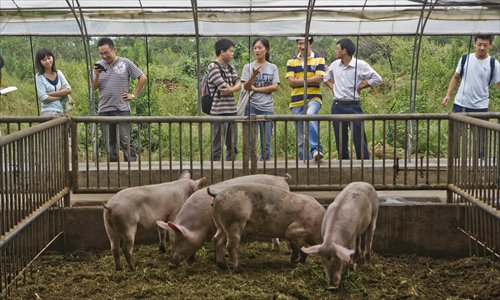

The use of antibiotics increases the rate of growth of pigs, as well as keeping them healthy in spite of being kept in cramped, filthy conditions. (Photo: GT/Li Hao)
Experts alarmed about the soaring use of antibiotics in pork
For pork lovers, a recent report published in the US academic journal Proceedings of the National Academy of Sciences makes for grim reading.
The report notes that the unprecedented growth in demand for meat globally has led to a significant increase in the amount of antibiotics used in the production of pork, beef and poultry.
The quantity of antibiotics used is the highest in the raising of pigs, with four times as much per pound of meat as in the raising of cattle.
Ramanan Laxminarayan, the study's senior author, told National Public Radio (NPR) that antibiotics are commonly used to keep animals healthy in spite of the overcrowded, unsanitary conditions in which they are kept to maximize production.
But the increased use of antibiotics, which Laxminarayan says are "literally the same antibiotics you get at a pharmacy," could lead to the spread of drug-resistant pathogens, posing a significant public health threat to both animals and humans.
China, which is home to half the world's pigs, was found to use more antibiotics in the raising of livestock than any other country.
"The main danger of overusing antibiotics in livestock farming is that it could lead to the birth of new, drug-resistant "superbug" that is harmful to humans," said Zhu Yi, associate professor of food safety at China Agricultural University.
In 2010, 63,000 tons of antibiotics were used in the raising of livestock around the world, according to estimates of researchers in the recently published study. This is roughly twice the amount of antibiotics prescribed to people that year.
Appetite for antibiotics
According to Zhu, China produces around 600 million pigs and 50 million tons of pork annually.
"I've warned [livestock farmers] that we should be cautious in using antibiotics in raising animals for several years," said Zhu.
According to a 2014 Shandong TV report, around 50 percent of pig farmers in Shandong and Liaoning provinces add antibiotics to the animal feed they use.
Wang Yongjun, an official with the Ji'nan Animal Husbandry and Veterinarian Administration, told Shandong TV that the use of antibiotics was economically motivated. Not only could antibiotics help ward off infectious diseases in animals, Wang said, but they also boosted the rate of their growth.
However, Wang acknowledged that there were dangers to using excessive amounts of antibiotics in the raising of livestock. He said that many livestock farmers were not aware of these dangers.
Compounding the problem, said Zhu, was the fact that manufacture of antibiotics in China was not strictly regulated.
"There are some companies that illegally use [antibiotic] waste to make animal feed or fertilizer," she said.
Xiao Yonghong, a professor at the Institute of Clinical Pharmacology of Peking University, estimated in the Hangzhou Daily report that China produces 210,000 tons of antibiotics per year, and that 97,000 tons of this was used in the raising of livestock.
This is a considerably higher number than the estimates of researchers of the Proceedings of the National Academy of Sciences report.
In comments made to NPR, Laxminarayan attributed the rising use of antibiotics in the animal sector to the growing demand for meat in middle-income countries.
The report noted that after China and the US, India and Brazil were the countries that used the most antibiotics in livestock farming.
"We project in the next 20 years, world consumption of antibiotics in animals will go up by two-thirds," Laxminarayan said.
Pork factory closes after 'recovered' pigs claim
2015-03-20Finland to export pork to China
2015-01-17Crackdown on network processing sub-standard pork
2015-01-138 officials dismissed over unsafe pork scandal
2014-12-29Unsafe pork enters into 7 provinces
2014-12-28Pork firms receive import permits from Russia as ban lifted
2014-09-23China's pork products heading to Russia
2014-08-22Tyson Foods looks for pork markets
2014-08-18Copyright ©1999-2018
Chinanews.com. All rights reserved.
Reproduction in whole or in part without permission is prohibited.